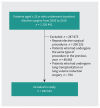Survival and health care costs after inpatient elective surgery: comparison of patients with and without chronic obstructive pulmonary disease
- PMID: 36649951
- PMCID: PMC9851642
- DOI: 10.1503/cmaj.220733
Survival and health care costs after inpatient elective surgery: comparison of patients with and without chronic obstructive pulmonary disease
Abstract
Background: Chronic obstructive pulmonary disease (COPD) is common among surgical patients, and patients with COPD have higher risk for complications and death within 30 days after surgery. We sought to describe the longer-term postoperative survival and costs of patients with COPD compared with those without COPD within 1 year after inpatient elective surgery.
Methods: In this retrospective population-based cohort study, we used linked health administrative databases to identify all patients undergoing inpatient elective surgery in Ontario, Canada, from 2005 to 2019. We ascertained COPD status using validated definitions. We followed participants for 1 year after surgery to evaluate survival and costs to the health system. We quantified the association of COPD with survival (Cox proportional hazards models) and costs (linear regression model with log-transformed costs) with partial adjustment (for sociodemographic factors and procedure type) and full adjustment (also adjusting for comorbidities). We assessed for effect modification by frailty, cancer and procedure type.
Results: We included 932 616 patients, of whom 170 482 (18%) had COPD. With respect to association with risk of death, COPD had a partially adjusted hazard ratio (HR) of 1.61 (95% confidence interval [CI] 1.58-1.64), and a fully adjusted HR of 1.26 (95% CI 1.24-1.29). With respect to impact on health system costs, COPD was associated with a partially adjusted relative increase of 13.1% (95% CI 12.7%-13.4%), and an increase of 4.6% (95% CI 4.3%-5.0%) with full adjustment. Frailty, cancer and procedure type (such as orthopedic and lower abdominal surgery) modified the association between COPD and outcomes.
Interpretation: Patients with COPD have decreased survival and increased costs in the year after surgery. Frailty, cancer and the type of surgical procedure modified associations between COPD and outcomes, and must be considered when risk-stratifying surgical patients with COPD.
© 2023 CMA Impact Inc. or its licensors.
Conflict of interest statement
Competing interests: Daniel McIsaac reports participation on the data safety monitoring board of the PRICE-2 trial. Andrea Gershon reports funding from the Canadian Institutes of Health Research and PSI Foundation, as well as a stipend from Novartis. No other competing interests were declared.
Figures



References
-
- Kroenke K, Lawrence VA, Theroux JF, et al. . Postoperative complications after thoracic and major abdominal surgery in patients with and without obstructive lung disease. Chest 1993;104:1445–51. - PubMed
-
- Gupta H, Ramanan B, Gupta PK, et al. . Impact of COPD on postoperative outcomes: results from a national database. Chest 2013;143:1599–606. - PubMed
-
- Fields AC, Divino CM. Surgical outcomes in patients with chronic obstructive pulmonary disease undergoing abdominal operations: an analysis of 331 425 patients. Surgery 2016;159:1210–6. - PubMed
-
- Elsamadicy AA, Sergesketter AR, Kemeny H, et al. . Impact of chronic obstructive pulmonary disease on postoperative complication rates, ambulation, and length of hospital stay after elective spinal fusion (≥ 3 levels) in elderly spine deformity patients. World Neurosurg 2018;116:e1122–8. - PubMed
Publication types
MeSH terms
LinkOut - more resources
Full Text Sources
Medical
